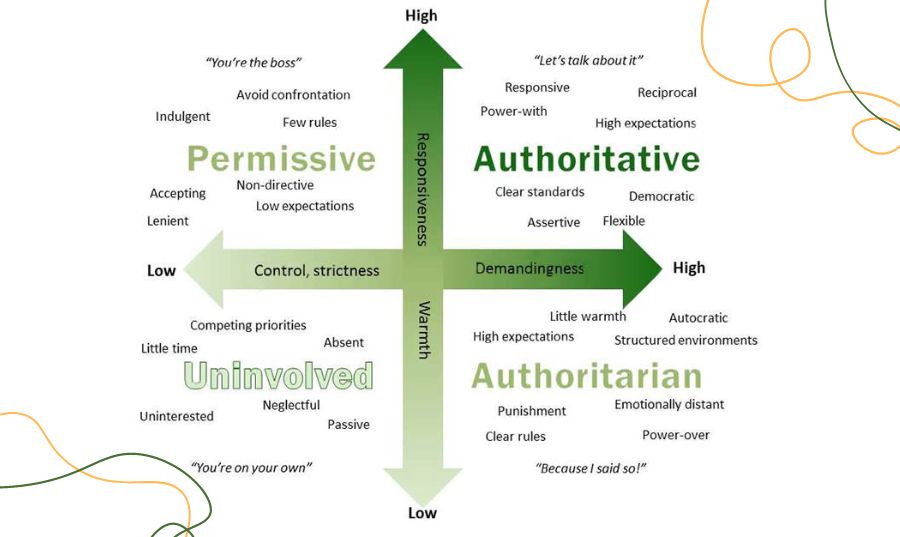The journey of parenthood is an exhilarating yet often overwhelming experience. From sleepless nights with newborns to navigating the complexities of teenage years, parents constantly grapple with the question of “how to raise a good kid.” In this ever-evolving social landscape, parenting styles take center stage. Which parenting style is most encouraged in modern America? This article delves into the different approaches, explores the merits of the most widely recommended style, and acknowledges the importance of tailoring parenting to individual needs.
The Parenting Style Spectrum

Parenting styles encompass how parents interact with their children, encompassing discipline, communication, and fostering independence. Four main styles have been identified:
- Authoritarian Parenting: This strict approach emphasizes obedience and adherence to rules, often enforced through punishment. While offering a sense of structure can stifle creativity and emotional development.
- Authoritative Parenting: This balanced style sets clear expectations but allows for discussion and explanation. Parents are nurturing and supportive while encouraging children to make responsible choices and develop independence.
- Permissive Parenting: This lenient approach prioritizes children’s freedom and minimizes rules. While fostering a sense of ease and connection, it can lead to a lack of self-control and difficulty with boundaries.
- Uninvolved Parenting: This disengaged style offers minimal guidance or emotional support. It can have detrimental effects on a child’s emotional and social well-being.
The Rise of Authoritative Parenting

Which parenting style is most encouraged in modern America? The answer leans heavily towards authoritative parenting. This approach aligns with the values of fostering independent, responsible, and emotionally intelligent individuals. Research consistently shows children raised in authoritative households have better social, emotional, and academic outcomes.
Here’s a closer look at the hallmarks of authoritative parenting, often referred to as the style ideal in modern America:
- Clear Expectations and Boundaries: Authoritative parents establish clear rules and expectations, providing structure and security. These expectations are not arbitrary; parents explain their reasoning, fostering understanding and cooperation.
- Warm and Responsive: Authoritative parents are nurturing and supportive despite setting boundaries. They create a safe environment where children feel comfortable expressing themselves and seeking guidance.
- Encouragement of Independence: Authoritative parents don’t micromanage their children’s lives. They provide opportunities for children to make choices, learn from mistakes, and develop a sense of autonomy. This fosters crucial life skills such as problem-solving and decision-making.
- Open Communication: Effective communication is a cornerstone of authoritative parenting. Parents encourage open dialogue, listen actively to their children’s perspectives, and explain their decisions. This builds trust and a sense of partnership.
Benefits of Authoritative Parenting in Modern America
The emphasis on balance in authoritative parenting resonates with the values of modern America. It equips children with the tools they need to thrive in today’s dynamic world:
- Academic Success: Authoritative parenting fosters a love of learning and provides the structure children need to excel academically.
- Strong Social Skills: Children raised with clear communication and opportunities for collaboration tend to develop strong social skills and healthy relationships.
- Enhanced Self-Esteem: The supportive and nurturing environment fosters a sense of self-worth and confidence in children.
- Resilience and Problem-Solving: Authoritative parenting encourages children to make choices and learn from mistakes, building resilience and problem-solving skills.
Beyond the Ideal: Adapting Your Parenting Style
While authoritative parenting is most encouraged in modern America, it’s essential to acknowledge that there’s no single “perfect” style. Every child is unique in their temperament and needs. Similarly, every family dynamic is different, with cultural backgrounds and personal values influencing parenting approaches. The key lies in adapting the authoritative framework to fit your specific situation.
Here are some pointers for adapting authoritative parenting:
- Consider your Child’s Temperament: Some children may require more structure, while others thrive with more autonomy. Adjust your approach accordingly.
- Cultural Influences: Cultural values can shape parenting styles. Incorporate your cultural background while aligning with core authoritative principles.
- Family Dynamics: Single parents, blended families, and large families may require adjustments to the authoritative approach.
- Flexibility is Key: Parenting is a journey, not a destination. Be prepared to adapt your approach as your child grows and your family dynamics change.
Which Parenting Style is Most Encouraged in Modern America?
- Authoritarian with a Twist: Some situations call for a more authoritarian approach, such as ensuring safety during emergencies. However, even in these instances, authoritative parents strive to explain the reasoning behind the rules and maintain open communication whenever possible.
- Permissive with Boundaries: The permissive style can effectively foster creativity and a sense of ease in children. However, it’s crucial to establish clear boundaries to prevent a lack of self-control. This aligns with the “positive discipline” concept, where consequences are used as learning opportunities rather than punishment.
- The Evolving Landscape: Parenting styles aren’t static entities. Modern America grapples with issues like increased screen time and social media pressure. Authoritative parents may need to adapt their approach to address these challenges by implementing stricter screen time limits or fostering open communication about online safety.
The Village Matters: The Role of Community
The responsibility of raising children only partially falls on parents’ shoulders. Modern America emphasizes the importance of a robust support system, often called “the village.” This village can consist of extended family, friends, teachers, and community members who provide children with guidance, support, and role models. A substantial village can alleviate parental pressure and improve a child’s well-being.
The Art of Balance: Achieving Harmony in Parenting
Which parenting style is most encouraged in modern America? Ultimately, the answer lies in achieving a balance for your unique family. Authoritative parenting provides a strong foundation, but remember:
- Be bold and adapt: There’s no one-size-fits-all approach. Tailor your parenting style to your child’s needs and your family dynamic.
- Communication is vital: Open and honest communication fosters trust and understanding between you and your child.
- Seek support: Don’t hesitate to contact your village for advice, support, and a listening ear.
- Enjoy the Journey: Parenthood is a beautiful and rewarding experience. Focus on fostering a loving and supportive environment where your child can thrive.
By embracing the core principles of authoritative parenting while adapting to your specific circumstances, you can navigate the maze of parenting and raise a confident, responsible, and well-rounded child in modern America.







A truly insightful read! Authoritative parenting is the best form simply because of it’s ability to teach social skills to our children. Lovely post!